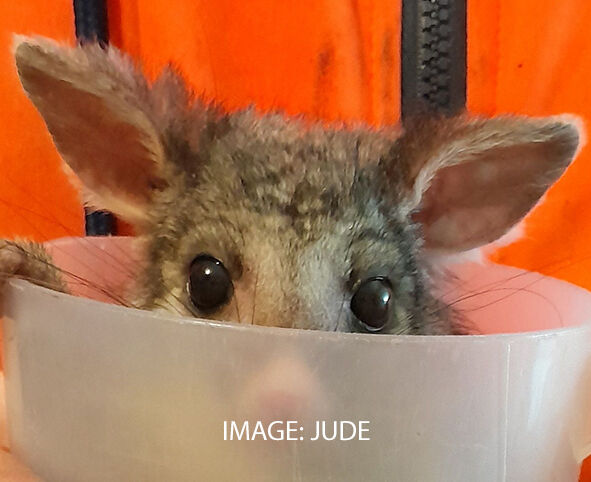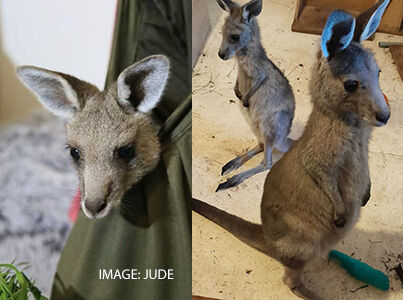In Conversation with Jude
Caring to the Max
Twenty eight possums! This is the record number currently in care with wildlife carer Jude. Eight macropods (roos and wallabies) are also being rehabilitated by Jude, who says, saying no is not something she can do.

Both ringies (ringtails) and brushies (brushtails) are housed in the many enclosures and care rooms on the property and every animal must go through a careful procession of steps before release. The two types of possum are kept separately as the independent, territorial and aggressive brushtails can harm or kill their more gentle, family oriented cousins.
The refuge also offers short term care for birds, reptiles, echidnas and koalas before they are forwarded on to carers and vets who specialise in their species. It's generally joeys though that find their way to Jude. Most have been retrieved from the pouches of their deceased mothers. Dog attacks and road casualties are common causes of death and injury. When Mum's been killed, it is important that somebody checks the pouch to see if there is a viable bubba. Jude says there is much more roadkill with the increase of traffic and the aggro of drivers who haven't got a second to waste and don't slow down. She has been caring for wildlife for many years and has witnessed the lessening numbers and loss of habitat. For a moment, Jude becomes the voice of the animals as they are disoriented by development, saying:- "Where am I? I'm looking for my food and it's not there anymore, there's nothing there!"
Food, of course, is just one of the ongoing needs of the rescued wildlife and Jude is up and out every day seeking browse (foliage food) for her hungry charges. Most nights she is up until well after midnight. The joeys also need formula and $1,000 worth can last as little as six weeks depending on demand. Medicines, bandages and other treatments also do not come cheaply. Then there's the power bills. An endless supply of towels need washing and drying. Heating and air conditioning are necessary to keep temperatures regulated at healthy levels. Enclosures must be cleaned, maintained and kept to strict DEECA (Department of Energy Environment and Climate Action) standards. The refuge was recently inspected by DEECA officers and given the green light for operations until 2025. Jude knows that the Department could still choose to inspect at any time and that her carers license depends on following the many rules to the letter. In short, the dedication, time and money required to keep the refuge in working order is no small feat. All of this is undertaken voluntarily and self-funded. Thanks also to the awesome volunteers who help out and are rescuers too.
When asked what would make her job as a carer easier Jude is straight forward and passionate:- "Recognition and acceptance from the government and society. Sure, people helping out with money, because it costs a lot of money and a lot of time...but, recognition that what we're doing is a valuable thing. Australia has this terrible attitude towards its' wildlife and it's very entrenched. Most people you talk to do care and love them but they have no idea whats really going on."

So which animals stand out most in Jude's memory? All of them! The pure love Jude has for wildlife is apparent as she reflects: "They're all individuals with their own personalities. These awesome animals! And they're so unique. We get some absolutely beautiful babies where you just rejoice that you've done this. But we've had to euthanise babies that we've got to know too. And that is (eff word) hard! But we have to do it. They've got to survive in the wild. Even though we love them dearly, our ultimate goal is to say - Goodbye. Go be who you are supposed to be. All of them. They're part of your soul.
Your heart and soul."
BWRAC would like to thank Jude and Greta Holack for the interview which provided the content for this article and the writing and editing by Jennifer Scuffins.
DONATE to support sick and injured wildlife here
